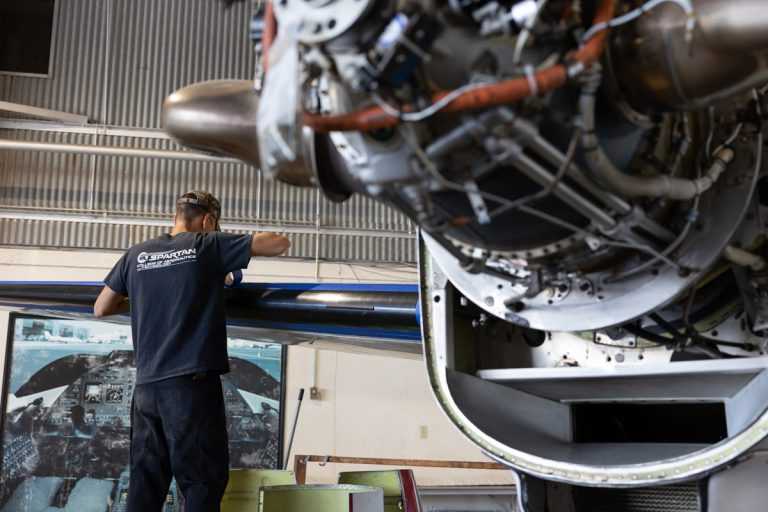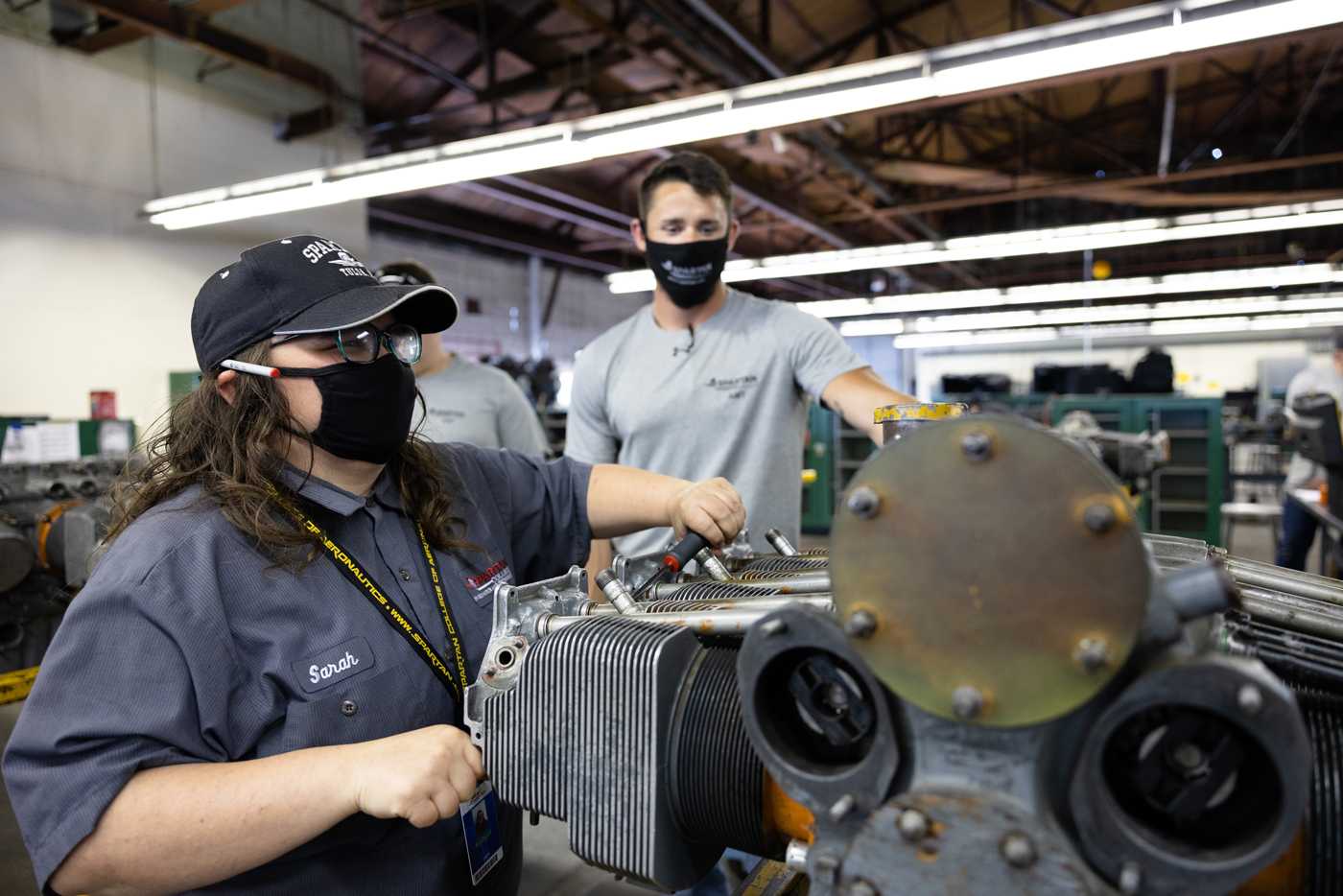


Modern aviation is a fascinating niche. There are many skilled men and women responsible for keeping planes safe to fly and running on schedule. One of those responsible is the Federal Aviation Administration (FAA) certified aviation mechanic. This is a field that offers a great deal of satisfaction for those who are fascinated with flight and the mechanics of how things work. If you have never had exposure to the aviation industry, though, it can be hard to know where you would begin. Fortunately, there are multiple paths that people who wish to work with airplanes can follow to become a part of the world of aviation maintenance.
What Does an Airplane Mechanic Do?
In order to fly safely, airplanes require reliable parts and preventative maintenance. Aircraft mechanics perform inspections, scheduled maintenance, and as-needed repairs on a wide range of aircraft.
Maintenance schedules are set by regulations established by the Federal Aviation Administration (FAA) and through the operators that fly that equipment. The maintenance schedule is often linked to hours flown, trips flown, days since the last inspection, or a combination of factors. Mechanics must understand the schedules to ensure that they stay within regulations.
Many airplane mechanics are generalists. They work on different kinds of aircraft that include helicopters, jets, and piston-driven airplanes.
Airplane mechanics can also specialize in specific type of aircraft or in specific systems. These can include the engine, electrical system, airframes or the hydraulic system.
In any given week, mechanics may do any of the following:
The daily life of an aircraft mechanic has a high degree of variety. This is work that requires commitment to ensure that every job is done right. A day in the life of airplane mechanics is filled with different tasks that keep them engaged with new challenges and expand their capabilities. No two days are alike.
Airplane Mechanics vs. Diesel and Auto Mechanics
If someone is mechanically inclined and considering working with engines, they'll probably notice that there is a dizzying array of potential paths for training. Which one is the right one to choose? Is there overlap in what someone will learn?
Auto Mechanics
Some auto mechanics work on business fleets; others work on individual consumers' cars. This is a different work set-up than most airplane mechanics, who will work on a large variety of aircraft from private aircraft to helicopters to commercial airplanes.
Like airplane mechanics, auto mechanics need training and certifications. Auto mechanics receive certifications from the Automotive Service Excellence (ASE). The ASE Master Certification includes demonstration of knowledge in eight core areas.
Many of the general skills that make a good auto mechanic also apply to aircraft mechanics. For instance, both need to be detail-oriented, subject matter experts, and dexterous. However, the systems and certifications are different enough that each requires its own distinct training.
Diesel Mechanics
Diesel mechanics, like airplane mechanics, typically work in industrial settings. Diesel mechanics most often work on large trucks and other heavy diesel-powered vehicles. There are also diesel mechanics who specialize in other areas that include boats or farm equipment.
There are no federal or state laws that require specific training to be a diesel mechanic. Additionally, there is no existing license or certification. Diesel mechanics can learn on the job through experience.
However, many people who hire diesel mechanics look for certifications like the ASE certification. It can also be useful to get a Commercial Driver's License (CDL). Mechanics often need to test drive vehicles to chase down problems or to ensure that a repair has been effective. A number of engine manufacturers have their own branded certification programs to teach mechanics how to work on their specific engines.

Airplane Mechanics
While each of these specialties have some overlap in general skills, experience cannot be directly applied from one to the other. For instance, time spent doing diesel mechanics can be valuable because you learn effective tool use. But the time spent working in diesel mechanics cannot be applied to the hours of experience required to become an airplane mechanic.
To get the necessary certifications, a prospective airplane mechanic will either need to attend an FAA certified FAR Part 147 program or equivalent time spent on the job learning how to work on aircraft.
Key Characteristics for Airplane Mechanics
No matter what our individual background and native talents, we all have characteristics that make us a good fit for certain types of work. Some people are good with numbers. Others quickly grasp how different kinds of machines work. There are many qualities that make someone a good fit for airplane mechanics. Some of the top ones include:
These are just a few of the qualities that make a good airplane mechanic. Some qualities may be second nature to some folks, but others can be developed with patience and practice.
Qualifications to Be an Airplane Mechanic
Under FAA regulations, aircraft maintenance must be performed by either a certified mechanic with the right ratings or performed under the supervision of someone with those credentials.
There are different ratings and certifications for different jobs. The Airframe mechanics rating, also known as the "A" rating, is offered to mechanics who are certified to perform maintenance of the airframe and its related systems. Powerplant mechanics — the "P" rating — is for people who perform maintenance on the engines and their related systems. There is also a combined rating known as the A&P. This is the preferred rating of many employers as the airplane mechanic can work on all aspect of the aircraft. These ratings generally certify that the mechanic possesses basic knowledge that is up to FAA standards.
Mechanics need to be at least 18 years of age, fluent in English, and attend an FAA approved AMT (airplane mechanic) school, like Spartan College of Aeronautics and Technology, or have thirty months of experience to qualify for both their Airframe rating and Powerplant rating (also known as A&P certifications).
To become an airplane mechanic, applicants need to pass oral, written, and practical exams. Applicants have two years to complete all exams once they have begun the testing process.
Once an airplane mechanic is certified, they must maintain their certification by working at least six months in a 24-month period. If they fail to do so, they must be supervised the next time they perform a maintenance task as an airplane mechanic.
Final Thoughts
The types of work that people can do as airplane mechanics are highly varied. The ways that people find an entrance to the field are variable as well.
Those who are considering this field can get a feel for it a few different ways. They can:
By getting input from a number of different sources, you can learn more about the day-to-day life of an airplane mechanic and whether aviation maintenance training is a good fit. Do research, seek knowledge, and make valuable connections that can help later on. Curiosity and drive can help you find the information you need to make the right decision for you and for your future as an airplane mechanic.
Affiliate Partner Program | Jobs at Spartan | Privacy Policy | Opt-out Policy | Privacy Notice - California Residents| Notice of Non-Discrimination | Website Accessibility Help | Transparency in Coverage Act
© 2024 SPARTAN COLLEGE OF AERONAUTICS AND TECHNOLOGY. ALL RIGHTS RESERVED.